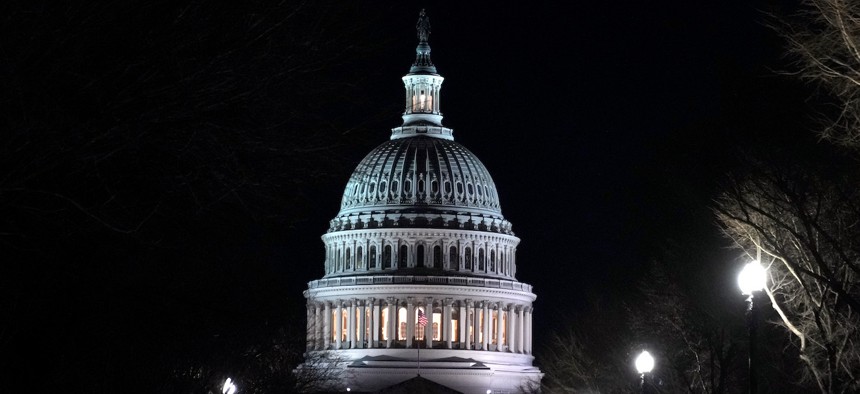
The U.S. Capitol shown here on Dec. 21, 2022. The Senate is set to reconvene Thursday morning. Drew Angerer/Getty Images
Funding Bill Hits a Snag in the Senate as Holiday Shutdown Looms
Senators cannot agree on which amendments to vote on as part of the fiscal 2023 omnibus.
The Senate hit a snag Wednesday night in trying to pass the $1.7 trillion funding bill to set line-by-line spending levels at every federal agency across government, putting Congress on the brink of a shutdown with two days until current funding expires.
Lawmakers met late into the night following a joint session address by Ukrainian President Volodymyr Zelensky to determine a voting procedure for the sprawling spending package. Earlier in the day there had been bipartisan optimism the Senate would reach an agreement to quickly vote on the fiscal 2023 funding measure, but those hopes were dashed as leadership could not strike a deal on which amendments to pursue. The House had hoped to vote on the bill Thursday to send it to President Biden’s desk, but the path forward is now uncertain.
The main disagreement appeared to stem from Sen. Mike Lee, R-Utah, demanding a vote on his amendment to keep the pandemic-era border security policy known as Title 42 in place. The initiative—which allows the Homeland Security Department to quickly expel many migrants crossing the border without an opportunity to claim asylum—was set to expire Wednesday, but the Supreme Court paused that from taking place as it weighs hearing a related lawsuit. Lee said he would only accept an up-or-down vote on the amendment that would require a simple majority for passage, but Democrats balked at the proposal for fear it would win sufficient approval and make the overall omnibus bill dead on arrival in the House.
Earlier on Wednesday, Senate Majority Leader Chuck Schumer, D-N.Y., threatened to force a vote on Friday if a scheduling deal could not be struck.
“There’s no reason for the Senate to wait and plenty of reasons to move quickly before a potential blizzard makes travel hazardous for members, their staff and families right before the Christmas season,” Schumer said.
Senate Minority Leader Mitch McConnnell, R-Ky., had previously implored his party to back the omnibus, suggesting it was “not a close call” as it would cut non-defense, non-Veterans Affairs Department spending when adjusting for inflation.
“There are literally two options before us,” McConnell said. “Number one, we can pass this bill, give our service members and commanders the resources they need, flip the president’s budget request on its head and actually cut baseline non-defense, non-veterans spending in real dollars, while we’re at it, or we can fail to pass this bill and give our armed forces confusion and uncertainty.”
The package provides an overall increase to non-defense discretionary spending of about 5.5% for a total of $773 billion, while Defense spending would soar by 10% to $858 billion. While Democrats failed to achieve their goal of equal funding increases on the two sides, the bill would achieve key priorities for both parties.
After the plans for late-night voting fell apart, Lee implored his Republican colleagues not to "support this beast" of the omnibus. He said they should instead vote only to approve a short-term stopgap bill that would punt on full-year appropriations until Republicans take control of the House in January.
Congress only got to this point of having an omnibus to vote on after appropriators spent months seeking a compromise on the top-line funding level and the defense and non-defense spending levels. They finally reached an agreement last week and subsequently scrambled to fill in the details. Negotiators released the text of the omnibus early Tuesday morning and rushed to find an agreement on which agreements would receive votes and the timing of final passage. While some lawmakers bemoaned the condensed schedule, members of both parties suggested a looming snowstorm and the appeal of getting home for the holidays had created an opening for all 100 senators to go along with the expedited timeline.
Earlier in the week, even those demanding amendment votes and criticizing the spending package for its size and rushed timing, showed little appetite to cause a Christmas shutdown.
“We're not going to win this war through dramatics,” said Sen. Mike Braun, R-Ind., who joined several colleagues on Tuesday in denouncing the funding process. “We're going to build solidly on this next year to try to reform the process in general.”
The Senate is set to reconvene Thursday morning, though without an agreement to expedite the process will have to wait until Friday to hold a vote. McConnell had previously set Thursday as his deadline to support the omnibus over a short-term measure. Schumer ended the night on a note of optimism, saying on the Senate floor negotiators were "making good progress."







